
Unlock Your Longevity Genes: How Emodin Extends Lifespan
"Discover the surprising benefits of emodin and its impact on anti-aging pathways. Can this natural compound be the key to a longer, healthier life?"
In an era where wellness and longevity are increasingly prioritized, the quest for accessible and natural methods to enhance lifespan has intensified. While numerous pharmaceutical interventions exist, many come with significant costs and potential health risks. This has led researchers to explore naturally occurring compounds with potential anti-aging properties, offering a more holistic and less invasive approach to extending human lifespan and enhancing overall health.
Emodin, an anthraquinone found in the roots and barks of various medicinal herbs, has traditionally been recognized for its anti-bacterial and anti-inflammatory effects. Recent studies have begun to uncover its potential role in anti-aging, sparking interest in its ability to influence fundamental physiological processes related to longevity. This research aims to explore the effects of emodin on lifespan and the underlying molecular mechanisms that contribute to its anti-aging properties.
Using Caenorhabditis elegans (C. elegans), a well-established model organism in aging research, scientists have investigated how emodin impacts lifespan and antioxidant capacity. C. elegans shares conserved longevity genes and signaling pathways with humans, making it a valuable tool for understanding the biological mechanisms of aging. This investigation focuses on emodin's interaction with the insulin/IGF-1 signaling (IIS) pathway, a critical regulator of lifespan, stress resistance, and overall health.
Emodin's Impact on Lifespan and Cellular Health

The study reveals that emodin extends the lifespan of C. elegans and improves their antioxidant capacity. Emodin functions via the insulin/IGF-1 signaling (IIS) pathway, specifically involving the transcription factor DAF-16. This protein is crucial for regulating genes that enhance stress resistance and longevity. The research indicates that emodin up-regulates DAF-16 target genes, boosting the worms' ability to combat oxidative stress and prolong life.
- Antioxidant Capacity: Emodin enhances the ability of cells to combat oxidative stress, a major contributor to aging.
- DAF-16 Activation: It up-regulates key genes involved in stress resistance and longevity, mediated by DAF-16.
- SIR-2.1 Dependence: Emodin's effects are partially dependent on SIR-2.1, emphasizing the complexity of aging pathways.
- IIS Pathway Modulation: By interacting with the insulin/IGF-1 signaling pathway, emodin influences fundamental aging processes.
Conclusion: Implications for Future Research and Applications
This research provides a significant step forward in understanding how natural compounds can influence aging and promote health. By uncovering emodin's role in activating key anti-aging pathways, this study supports the development of emodin as a dietary supplement. Further research is warranted to explore its potential benefits for human health and to fully understand the mechanisms through which it operates.
